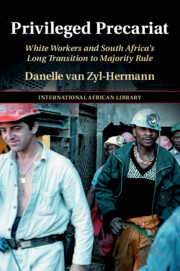Book contents
- Privileged Precariat
- The International African Library
- Privileged Precariat
- Copyright page
- Dedication
- Contents
- Table and figures
- Acknowledgements
- Abbreviations and acronyms
- Introduction
- Part I White workers and the racial state
- Part II White workers and civil society mobilisation
- Bibliography
- General titles
- Newspapers and online sources
- Index
- Series page
Introduction
The return of the white working class
Published online by Cambridge University Press: 17 April 2021
- Privileged Precariat
- The International African Library
- Privileged Precariat
- Copyright page
- Dedication
- Contents
- Table and figures
- Acknowledgements
- Abbreviations and acronyms
- Introduction
- Part I White workers and the racial state
- Part II White workers and civil society mobilisation
- Bibliography
- General titles
- Newspapers and online sources
- Index
- Series page
Summary
The Introduction presents the book’s central historiographical and analytical argument – that a focus on white workers facilitates a critical examination of class alongside race, as historically contingent social phenomena, in late and post-apartheid South Africa. This contributes a view from the South to international debates on identity and inequality in the context of late capitalism. South Africa boasts a rich historical scholarship on white working-class lives in the early twentieth century. Yet when it comes to the apartheid and post-apartheid periods, white workers and considerations of class are largely absent. This results in a homogenising view of white society – a scholarly blind spot reflecting not only the widespread acceptance of ideas surrounding apartheid-era white embourgeoisement, but also the ‘death’ of class analysis and the dominance of identity debates. This book returns class to analytical prominence alongside race. In contrast to dominant ‘elite transition’ views, it introduces the idea of a ‘long transition’ from the 1970s, as labour reform heralded the dismantling of the racial state and adoption of neoliberal policies. Breaking away from parochial exceptionalism, this places South Africa within the recent history of capitalism and contributes to international debates on the consequences of global structural shifts since the 1970s.
Keywords
- Type
- Chapter
- Information
- Privileged PrecariatWhite Workers and South Africa's Long Transition to Majority Rule, pp. 1 - 30Publisher: Cambridge University PressPrint publication year: 2021



